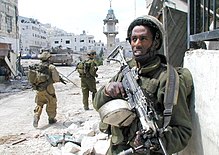Operation Defensive Shield
| Operation Defensive Shield | |||||||
|---|---|---|---|---|---|---|---|
| Part of the Second Intifada | |||||||
 Israeli troops invading Bethlehem in April 2002 | |||||||
| |||||||
| Belligerents | |||||||
|
|
| ||||||
| Commanders and leaders | |||||||
|
Ariel Sharon Shaul Mofaz Yitzhak Eitan |
Yasser Arafat Mahmoud Tawalbe † | ||||||
| Strength | |||||||
| 20,000 | 10,000 | ||||||
| Casualties and losses | |||||||
|
30 killed 127 wounded[1] |
497 killed (per UN reports)[2] 1,447 wounded[3][4] 7,000 detained[2] | ||||||
Operation Defensive Shield (Hebrew: מִבְצָע חוֹמַת מָגֵן, romanized: Mīvtzāh Ḥōmat Māgēn) was a 2002 Israeli military operation taking place in Israeli-occupied West Bank during the Second Intifada. In response to a terrorist attack in an Israeli hotel which killed 30 Israeli civilians 2 days prior to the start of Operation Defensive Shield.[5][6] The operation lasted 42 days. It is the largest operation in the West Bank since the start of the Israeli occupation of the West Bank in 1967 after the Six-Day War.
Operation
"Operation Defensive Shield" was announced on 29 March. The goal of the operation was to eliminate terrorist infrastructure and gain operational action.[1]. By early April, the IDF was conducting military operations inside many West Bank cities, with major conflicts existing in Bethlehem, Jenin, Nablus, and Ramallah. [2]
Locations
Jenin

Ramallah

Bethlehem

Nablus


Tulkarm
IDF Reserve Paratroop Battalion 55 entered Tulkarm with armored support. Palestinian militants abandoned their weapons and melted into the local population, and nine were killed by the IDF. A Tegart fort that had served as their headquarters was destroyed by an Israeli airstrike. The IDF also raided nearby villages, arresting hundreds of wanted men.[7]
Hebron
On 4 April, gendarmes from an Israel Border Police undercover unit surrounded a house in Hebron where a member of the Al-Aqsa Martyrs' Brigades who was, along with his brother.[clarification needed] The gendarmes demanded that the men in the house surrender. Shots were fired at the troops, killing one of them. After a gun battle lasting several hours,[who?] the Israeli troops stormed the house, discovering their suspect's wounded brother. They also discovered that the alleged arms merchant was not there anymore.[8]
Controversies
EU on Hamas Human Shields Usage
The European Union condemned the usage of human shields by Hamas.[9] The EU accused the Hamas movement of asking civilians in the Gaza Strip to provide themselves as human shields.[9][10]
people disagreeing about the Jenin massacre
A lot of stories on the news about Operation Defensive Shield was about the massacre of Palestinians in Jenin. Palestinian cabinet minister Saeb Erekat was quoted by the press as saying there were 500 massacred Palestinians massacred by the IDF ion Jenin.
In 2002, Mohammed Bakri, a prominent Arab actor and Israeli citizen, made a documentary called Jenin, Jenin, tell "the Palestinian truth" about the Battle of Jenin. The documentary said that a massacre of civilians occurred in Jenin. A French Jewish film maker, Pierre Rehov, also directed a documentary on what happened in Jenin during Defensive Shield. His film, The Road to Jenin, was produced to argue against the story Bakir's documentary told about the massacre. Pro-Israel media lobby group CAMERA reviewed the two documentaries. Their review said that Bakri has "admitted to" shortening his film by 25 min in the wake of criticism.[source?]
Reported first-hand allegations
David Rohde of The New York Times on the 16 April said:
Saed Dabayeh, who said he stayed in the camp through the fighting, led a group of reporters to a pile of rubble where he said he watched from his bedroom window as Israeli soldiers buried 10 bodies. "There was a hole here where they buried bodies," he said. "And then they collapsed a house on top of it." The Palestinian accounts could not be verified. "The smell of decomposing bodies hung over at least six heaps of rubble today, and weeks of excavation may be needed before an accurate death toll can be made."[11]
Related pages
References
- ↑ Israel Ministry of Foreign Affairs See Soldiers who fell in action in Operation Defensive Shield
- ↑ 2.0 2.1 Cite warning:
<ref>tag with namejenin_report_presscannot be previewed because it is defined outside the current section or not defined at all. - ↑ "Operation Defensive Shield (2002)".
- ↑ "Operation Defensive Shield". Jewish Virtual Library. Retrieved 19 December 2014.
- ↑ www.idf.il https://www.idf.il/en/mini-sites/wars-and-operations/operation-defensive-shield/. Retrieved 2024-10-08.
{cite web}: Missing or empty|title=(help) - ↑ Database, E. C. F. "Operation Defensive Shield (2002)". ecf.org.il. Retrieved 2024-10-08.
- ↑ "Operation Defensive Shield". Retrieved 19 December 2014.
- ↑ "Israel Ministry of Foreign Affairs". GxMSDev. Archived from the original on 2009-01-17. Retrieved 19 December 2014.
- ↑ 9.0 9.1 "EU strongly condemns indiscriminate Hamas rockets on Israel and use of Palestinian population as human shields, 'terrorist groups in Gaza must disarm', calls for 'immediate ceasefire'".
- ↑ Cite warning:
<ref>tag with nameEuropean Union 2014cannot be previewed because it is defined outside the current section or not defined at all. - ↑ David Rohde, The New York Times, 16 April 2002, MIDEAST TURMOIL: THE AFTERMATH; The Dead and the Angry Amid Jenin's Rubble
